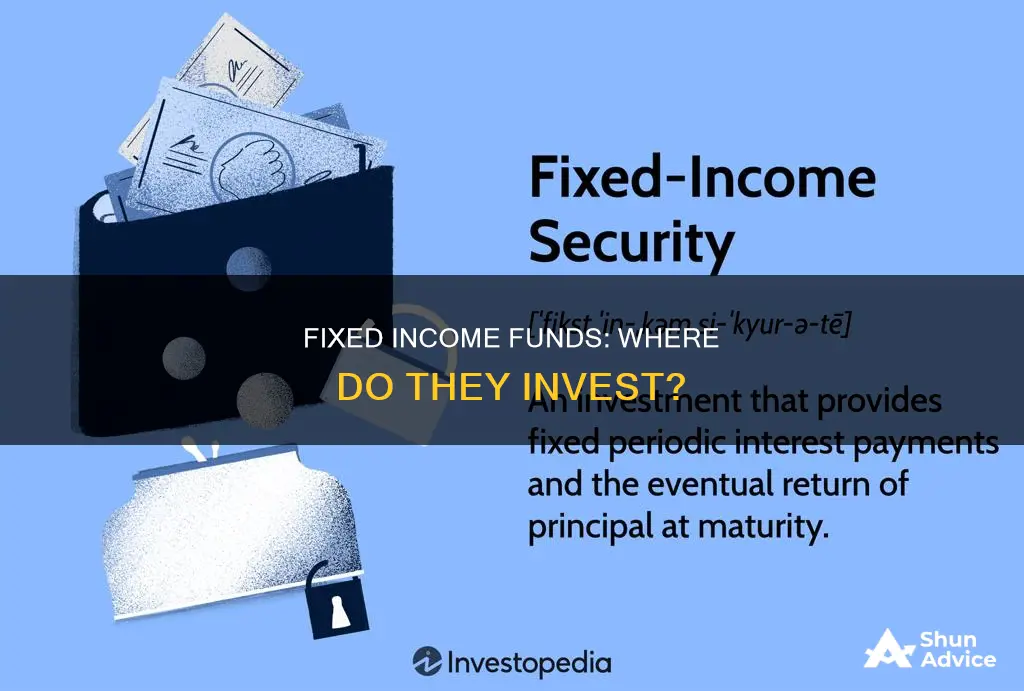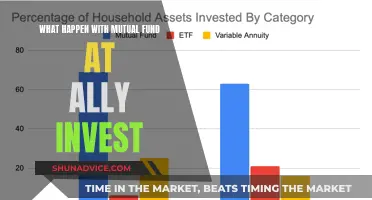
Fixed-income funds, also known as bond funds, are a type of investment that provides regular income in the form of fixed interest or dividend payments. These funds invest in a diverse range of fixed-income securities, including government bonds, corporate bonds, international bonds, and money market instruments. By pooling money from multiple investors, bond funds purchase a large number of bonds issued by governments and companies, receiving regular interest payments in return. These funds then distribute the interest earned as dividends to their investors. Bond funds can also sell the bonds in their portfolio to recover their original investment or generate profits. Fixed-income funds offer a range of benefits, such as steady income, diversification, and professional management, but it's important to consider the associated risks, including interest rate risk, credit risk, and liquidity risk.
| Characteristics | Values |
|---|---|
| Type of investment | Regular income |
| Other names | Bonds |
| Examples | Treasury bills (T-bills), government bonds, corporate bonds |
| Definition | Collective instruments that invest in a large number of bond securities issued by governments and/or companies |
| Function | Lend money to issuers and receive regular interest payments |
| Interest payments | Made at regular intervals, usually every 6 months |
| Maturity | The principal amount is repaid upon maturity |
| Risk | Not capital guaranteed; the value of a bond fund can rise or fall |
| Management | Professionally managed by a team of experts; charge a small management fee |
What You'll Learn

Money market funds
The primary advantage of money market funds is that they offer a safe and liquid avenue for investing in secure, cash-equivalent, debt-based assets using smaller investment amounts. Many investors prefer to park substantial amounts of cash in such funds for the short term. However, money market funds are not suitable for long-term investment goals like retirement planning, as they offer little capital appreciation.
There are several types of money market funds, including:
- Prime Money Funds: These funds invest in floating-rate debt and commercial paper of non-Treasury assets issued by corporations, government agencies, and government-sponsored enterprises.
- Government Money Funds: These funds invest primarily in cash and government securities, such as Treasury bills, bonds, and notes.
- Tax-Exempt Money Funds: These funds offer earnings that are free from U.S. federal income tax and may also be exempt from state income taxes. They are also known as municipal money market funds and primarily invest in municipal bonds and other debt securities.
- Retail Money Funds: These funds are accessible to individual investors due to their small minimum investment amounts.
- Institutional Money Funds: These funds are targeted at institutional investors and have a high minimum investment amount, often $1 million.
Smaller Companies, Bigger Returns: Investing in Franklin India's Future
You may want to see also

Government bond funds
One advantage of investing in government bond funds is the potential for tax exemption on a federal and/or state level for a portion of the income stream. However, similar to other mutual funds, if investors sell their positions at a gain, the profit is subject to capital gains taxes. Additionally, there may be taxable year-end capital gains distributions made to shareholders.
It is important to note that US government bonds are considered to be of the highest credit quality. Bond funds that specialise in US Treasury securities, including Treasury Inflation-Protected Securities (TIPS), offer the lowest potential return but are considered the safest.
NHCU's Investment Strategies: Where Are Funds Allocated?
You may want to see also

Corporate bond funds
When investing in corporate bond funds, it is essential to consider the fund's tenure and the credit ratings of the companies in its portfolio. These funds can be short-, medium-, or long-term, and some perpetual bonds are also available. Top-rated companies with high CRISIL credit ratings, typically top public sector companies, are generally considered safer investments.
Some popular examples of corporate bond funds include:
- IShares 5-10 Year Investment Grade Corporate Bond ETF
- SPDR® Portfolio Intermediate Term Corporate Bond ETF
- Vanguard Intermediate-Term Corporate Bond ETF
- ICICI Prudential Corporate Bond Fund
- HDFC Corporate Bond Fund
Warren Buffett's Stance on Index Funds Explained
You may want to see also

International bond funds
International fixed-income funds are a way to gain exposure to foreign government and corporate bond income. These funds also provide diversification to an investor's portfolio by adding assets denominated in currencies other than the US dollar. However, international exposure comes with exchange rate risk, as the value of foreign currencies fluctuates relative to the dollar.
World bond portfolios typically invest 40% or more of their assets in fixed-income instruments issued outside of the US. These portfolios primarily invest in investment-grade-rated issues but can vary in their strategies. Some funds take a conservative approach, focusing on high-quality bonds from developed markets, while others are more adventurous, investing in lower-quality bonds from developed or emerging markets. Certain portfolios invest exclusively outside the US, while others include both US and non-US bonds.
Some examples of international bond funds include the VALIC Company I Intl Govt Bond Fund, BlackRock Strategic Global Bond Fund, and EuroPac International Bond Fund. These funds seek to provide high current income or total return by investing in a diverse range of global fixed-income securities.
When considering international fixed-income funds, it is essential to evaluate the management fees, expense ratios, track record, minimum investment requirements, and recurring purchase programs. Additionally, investors should be mindful of the exchange rate risk associated with international exposure.
Direct Mutual Fund Investment: A Step-by-Step Guide
You may want to see also

Dividend-bearing mutual funds
Dividends are the investor's share of a company's profits. The company decides the amount based on its financial results. Dividends may be paid in cash or additional shares. Not all companies pay dividends to common shareholders, but those who do must get it approved by the shareholders through voting rights. Dividend-bearing mutual funds are required by law to distribute their accumulated dividends at least once a year.
When investing in dividend-bearing mutual funds, it is essential to consider the fund's management fees, expense ratios, track record, minimum investment requirements, and recurring purchase programs. Additionally, investors should be aware of the tax implications of dividend income, as dividends may be taxed as ordinary income or capital gains.
Unlock Real Estate Investing Using Retirement Funds
You may want to see also
Frequently asked questions
Fixed-income funds, also known as bond funds, are collective investment vehicles that hold a large number of bond securities issued by governments and/or companies.
Fixed-income funds invest in a wide range of fixed-income securities, including government bonds, corporate bonds, international bonds, and money market instruments. Some funds may focus on a specific category of fixed income, such as U.S. Treasury bonds, while others may offer a mix of different types.
Fixed-income funds offer several benefits, including diversification, lower investment thresholds, and professional management. They provide access to a diversified portfolio of bonds at a lower investment amount compared to purchasing bonds directly. Additionally, these funds are professionally managed by experts who identify attractive investment opportunities and adjust the portfolio based on economic conditions and credit quality.
Fixed-income funds are subject to various risks, including interest rate risk, credit/default risk, and liquidity risk. The value of the fund can fluctuate, and higher-yield funds tend to hold riskier bonds. It's important to consider the fund's mandate, duration, credit quality, and underlying bond holdings when evaluating risk.







